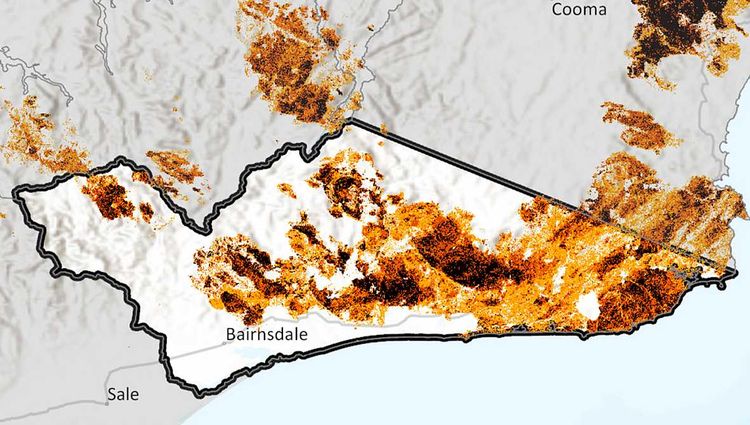On the beat of bushfire resilience

Looking to increase the likelihood of your community successfully enduring another summertime plagued with devastating fires? Extend an invitation to your neighborhood law enforcement officer to join you for a morning tea gathering. Yes, you heard it right!

There is solid scientific evidence to validate it.
Associate Professor Jarrett Blaustein from the Australian National University (ANU) recently conducted research on the response of rural towns in East Gippsland, Victoria, to the devastating bushfires that occurred during the 2019-2020 "Black Summer" emergency.
The wildfires raged fiercely and swiftly. In the midst of dim crimson skies and charcoal debris, countless individuals were compelled to seek refuge along the coastline. The naval forces were required to save numerous individuals.
Following a relentless period of firestorms enduring for two months, a tragic loss of life occurred as four individuals sadly perished, while numerous dwellings were ravaged and a vast expanse of 1.4 million hectares succumbed to destruction.
It had the potential to be a lot more terrible.
"During our visit to these towns in East Gippsland, it was evident that the police force had dedicated their time and attention to preparing for disasters, acknowledging the importance of such efforts," Blaustein remarks.
And when it was challenged, the ability to endure often depended on the information the local law enforcement possessed, their connections, the connections of their connections, and the information they were unaware of.
According to Blaustein, police organizations should play a role in every step of the emergency management planning process. This doesn't just include responding to emergencies, but also taking part in prevention, preparedness, and recovery efforts. This change in mindset is quite significant for police organizations, considering the various demands they have to address.

The frequency and severity of climate-related disasters are on the rise, which is adding another burden onto the already overwhelmed country police officers.
According to Blaustein, if we consider things from a police officer's perspective, they encounter a wide range of occurrences each day. These events are generally quite unpredictable. Police officers possess the ability to efficiently adjust to unfamiliar circumstances or emergencies, even if they haven't undergone specialized training for them.
And they don't require extensive knowledge, he remarks. They simply need to be the suitable individual.
According to Blaustein, the police we had a conversation with acknowledged that they might not possess the required technical expertise or abilities to make significant determinations regarding the necessary actions. However, they did possess the necessary competencies in terms of organizational acumen and leadership qualities to effectively guide and direct this procedure towards the correct path.
Rural areas such as East Gippsland commonly display a proactive nature. Nevertheless, inhabitants often exhibit hesitancy when it comes to assuming positions of authority or taking on responsibilities for organizing.
And that's where the local authorities can intervene.
According to Blaustein, these individuals possess a strong connection with the surrounding community. They are expected to actively address and prioritize the needs and issues within their local sphere. Simultaneously, they also function within a hierarchical system that can be activated to establish and organize collective efforts.
The police from East Gippsland who were a part of the research project actively engaged themselves in the initiatives aimed at enhancing disaster preparedness and response in the region.
Next arrived the catastrophic wildfires during the Black Summer season along the Eastern Coast.
"In observing that particular nearby neighborhood, the officers displayed exceptional competence in offering assistance and actively participating," comments Blaustein. "I wouldn't describe it as a process led by the police. However, the police played a crucial role."
The nearby societies were somewhat prepared, which allowed law enforcement to be quick and flexible.
"But they labored exceptionally lengthy hours," he shares. "And, when the day concluded, they couldn't simply log off and relax with a cold beer. They had to head back to their own residences and loved ones and face the turmoil on an intimate and individual scale."
According to Blaustein, merely dispatching aid teams from the urban area is insufficient. He argues that these crews lack essential familiarity with the area and acknowledgement from the community.
"I believe it is impractical and unjust to burden only one or two officers with all of this," he remarks.
However, until the federal and state governments of Australia devise a permanent solution, it is essential to implement smaller, adaptable measures to assist law enforcement in addressing these difficulties.
"We must make an effort to move past the notion of considering emergency management policing as a separate and extraordinary aspect of police work, and instead view it as an essential and regular part of policing," Blaustein concludes.
The research findings have been made available to the public through the publishing of the study in the International Journal of Disaster Risk Reduction.
The Greenlight Project is a comprehensive investigation spanning a period of one year, examining the measures taken by rural parts of Australia to get ready for and adjust to the impacts of climate change.

